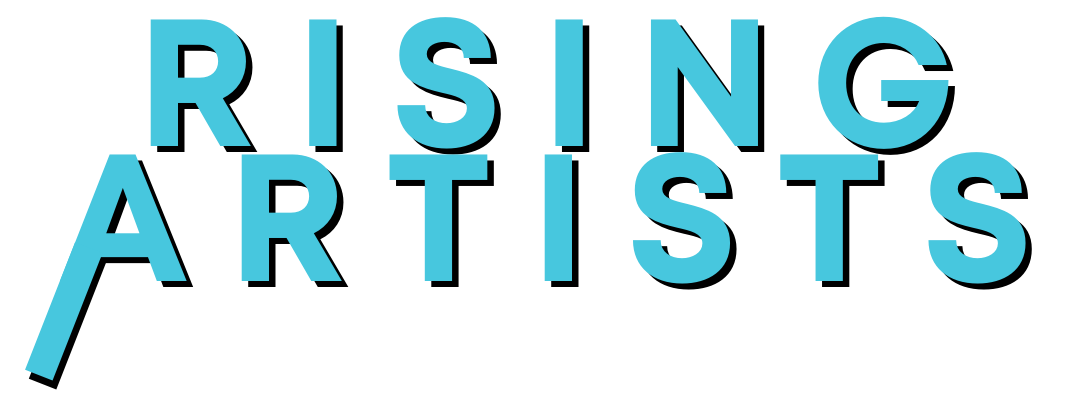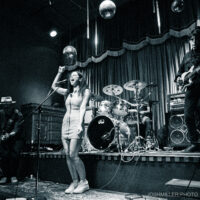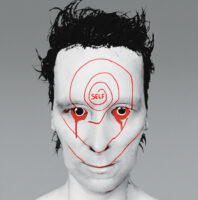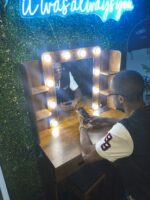Amelia Moore is someone who easily leaves a strong impression. From her fiercely red hair to the color soaked fashion that lives on as an abstract idea as fearless and passionate, Amelia Moore is an artist who doesn’t shy away from being different. But the first impression could barely capture the power and potential in her music. In the artist’s debut EP teaching a robot to love, Moore taps into a dangerous field, pushing her voices to near breaking points, where the primal screams are returned, exposing every nerves and emotions out in the open. It was the kind of screams that you remember deeply in your souls, but they become vague in the restraint and silenced society.
“i feel everything” is a song like that. It delves into the heartbreaking, painful screams from the top of the lung when an experience or situation became unbearable. No one should suffer in silence. Speaking about toxic relationships where one party feels everything and the other responses like a robot — that’s where the project was born — at the breaking point. “i feel everything” is a special track in the Moore’s EP that the explosive power and raw aesthetic of her voice is simply enough to channel the entire song. Amelia Moore has the voice that makes all the other instruments lose their colors. All there left and needed to be was a thumping beat, naked and bleak, to see her voice dances, bleeds, screams, and embraces in between and atop.
But then, there are songs like “crybaby” and “vinegar” that digs out the buried bones and rocker’s spirit in pop. Within those dark and luscious exploration that channels through a melancholy urban sensation, Amelia Moore again found her footing in the breaking point between sultry falsettos and repressed screams. It melted in her music like a sound dropping from the distant street — the modern screams are constantly there, but they are harder to notice because people have acknowledge their existence as simple as a high note in the background.
Amelia Moore and her impressionistic performance is becoming a fearless symbol for truth and courage. Music making has been a therapeutic process for the artist. She reflects and opens up about her breakup in teaching a robot to love. Without realizing, her songs has become a safe space for listeners to explore the lingering anger and find strength in vocalizing their experiences.
Written by Katrina Yang

Press Q&A with Amelia Moore
Q (GRRRL Music): Songwriting trend that is happening where women are opening up about their shitty toxic relationships. Do you think this form of storytelling has been healing for you? What do you hope your audience take from it?
Amelia Moore: Writing this whole project has been very healing for me. Going through a toxic situation ship with a toxic man, and Songwriting has always been a form of therapy for me, but I think one of the reasons why I feel so excited to put this project out is because I feel so connected to it and it’s gonna make it a lot easier to my listeners to relate to it. It’s just honest and relatable where I don’t shy away from saying anything that I felt like that I needed to say. I think women should continue to expose the toxic pieces of sh*t that did them wrong through songwriting and art.
Q (Glasse Factory): How did you aim to use your EP as a tool for audiences to uncover elements of their vulnerable and true selves.
Moore: What I wanted to do with the title was to give people another word to describe their partner instead toxic or emotional. They are particular type of people. I’d like to like the word to become a regular part of conversations, like “this guy is a robot. It’s a red flag. This one’s gotta end.” That would be really fierce, but also I really hope the listeners that relate to this music to feel really heard and seen and know that if they ever feel like this teaching a robot to love before (so have I), new beginning often hides themselves in endings. I felt this project is an ending to me, but it’s also a new beginning.
Q(The Come Up): What is the importance of live instruments in your music?
Moore: I started playing violin when I was four years old. It gave me such a good ear. I’m really good at hearing things in my head. I realize without really realizing it but I felt so creatively restricted when I was learning violin. It was a very typical instrument that I was learning somebody else’s music. I felt trapped. There was no creativity in it. As soon as I quit, I started playing piano and felt complete freedom. I would jut be watching YouTube videos all day long. I still play piano now and I’ve been really getting into more live instruments in my newer music. There’s a lot of piano in Teaching Robot to Love. I’m really exciting to explore piano in my music in the near future. I think production can date your music really easily, but acoustic instrument like piano and acoustic guitar can be around forever.
Q: Do you think it’s difficult to include radical honesty throughout all arenas of your life?
Moore: I feel like with me though, what you see is what you get. I’ve always been the kind of person that keeps very even across the board. For the rollout of this project though, it has been really fun. I’ve been very picky and particular about the details. Yeah, I feel what you see in the internet is what you get about me as a person. The music is as honest as a conversation with me about my breakup.
Q: What’s your favorite moment on tour?
Moore: there were obvious many highlights, but that’s a moment very special for me. In San Diego, it was my fourth show ever, I was starting to get comfortable on stage. I was singing “Sweet and Sour” at the time and one girl at the front row knew literally every single word. I went into the tour well aware that fairly everybody would know who I am, but this one girl knew every single word. As soon as I saw her, I knew I had to give my gift kit to her. Her name was Katelyn and it was just a very special moment for me.
Q (Riot Rage Mag): How do you feel you’ve grown as an artist since your first day?
Moore: I think I’m a lot more comfortable writing alone, and it’s becoming more enjoyable instead of something scary. It was kind of intimating. I typically loved writing with another person in the room to bounce ideas. I recently have grown to enjoy the transparency whenever I’m alone, not going through somebody else for ideas. I’ve grown a lot as an artist since I put our Sweet and Sour in October. I think the most obvious things are my taste in fashion and makeups. I’ve had a lot of fun experimenting with my style and different makeup inspirations.
We grew up in a very religious household. One thing that we knew we were going to do was going to church on Sunday and Wednesday. Sunday morning, Sunday night, sometimes, we would go on Saturday. As I kid, I didn’t do a lot. We were so involved in church and we had to put in so much time into that. I’m very grateful for what I’ve learned. Church was the place where we didn’t feel like we were struggling. I couldn’t listen to rap music or R&B music, it was strictly gospel music and gospel rap. My mom didn’t figure out I was making music until I was in the Marine Corps. When I started listening to Drake, I started rapping. I started singing a little bit more when I went to the Marine Corps. For the most part, growing up in a church did a lot for me on the good side. It motivated my spirit for who I am today.
CLICK HERE TO LEARN MORE ABOUT TEACHING A ROBOT TO LOVE
STREAM TEACHING A ROBOT TO LOVE
FOLLOW AMELIA MOORE












